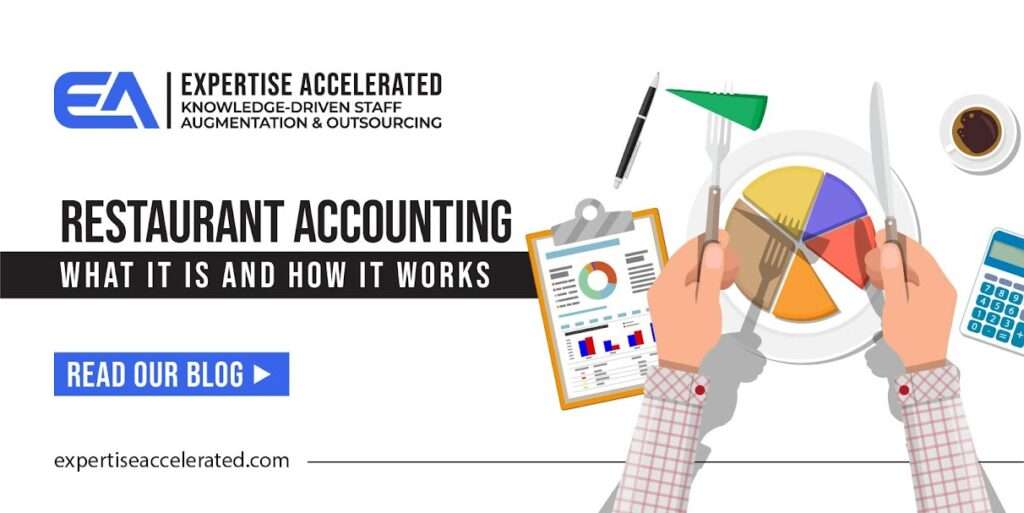
Restaurant accounting is the type of accounting that involves managing the financial transactions of restaurants, such as recording, analyzing, and interpreting financial statements, bookkeeping records, and payroll and operating costs.
A well-established accounting system in place is essential for the long-term success of a restaurant as it helps businesses gain a competitive foothold in the industry. It can also help SME owners make informed financial decisions for the betterment of their firm and remain compliant with the rules and regulations of their country.
Closely analyzing a restaurant’s inventory management and bookkeeping can help business owners identify areas where they can cut costs and if there are any extra products that they might be purchasing.
Restaurant Accounting Methods
There are two accounting methods for restaurants: Cash accounting and Accrual accounting. The most common method of restaurant accounting is cash accounting or cash basis. Here, businesses record their generated income when the cash is received from products sold.
Restaurants usually deal with a significant amount of cash daily, hence cash method is the preferred one by restaurants that have less than 1 million in revenue.
Restaurants with 1 million in revenue usually prefer the accrual method. In the accrual method, the records are updated just as the financial transaction takes place, regardless of the cash received. This method provides business owners with extensive details about how income is generated, expenses are incurred, and how they might relate to one another.
For effective restaurant accounting, business owners can rely on the following tips to help their firm stand out in the food and beverage industry.
Set Up Your Books
Bookkeeping is a process that keeps track of the products that are being bought and sold by the restaurant. Keeping a close track record of your books can help you identify core areas where you can minimize costs by reducing the amount of products bought in case of less demand.
It is recommended that business owners hire a bookkeeper who has served in the food and beverage industry and understands its terms and complexities. You can also rely on an outsourcing accounting firm that specializes in restaurant accounting.
Accounting Software
Purchase a reliable accounting software through which you can streamline data entry tasks, track revenue and cash flow statements, and create customized invoices. Although there may not be an ideal restaurant accounting software, a good one should offer efficient reporting features, accessibility, and real-time reporting. This can allow you to gain access to your data anytime and anywhere.
Chart of Accounts
Another important step is to set up a chart of accounts for your business to categorize the money flowing in and out of it. A standard chart of accounts covers assets, expenses, revenue, owner’s equity, and liabilities.
POS System
Any restaurant business, whether a small bakery or fine dining, needs a POS system to streamline processes, which include recording transactions, managing inventory, and sending or printing receipts.
Choosing software that is easy to use and offers the newest features can help your employees keep their finances up to date and minimize errors.
Track Payroll
Payroll is the process of recording employees’ wages and working hours. With a big restaurant, keeping track of employee working hours and analyzing their performance with respect to their salaries can be challenging. Especially if resources are working for different pay rates in the restaurant. It is thus recommended that restaurant owners hire an outsourcing firm to track and manage their payroll better.
Track Past Record
Evaluating your restaurant’s past financial records can help you avoid repeating errors and use this data to make informed future financial decisions.
Accounts Payable
Account payable is a record of the amount that restaurants might owe the suppliers for goods bought. Timely payment to vendors and suppliers is essential to streamline the functions of a restaurant. Invoices should be updated on the accounting software as soon as they are received. This can help restaurant owners stay up to date with payment schedules.
Sales
Restaurant owners can use accounting records to keep a daily record of earnings from food and merchandise sales or catering contracts. This can help you find out how much revenue you are generating each day and which products are most sold.
Prime Costs
Prime cost provides restaurant owners with supply costs that may be allocated to specific activities such as menu items or catering. It is the combined cost of food and ingredients in addition to labor expenses. Prime costs do not include external costs, which can include advertising and payroll costs.
Expertise Accelerated: Your Gateway to Skilled Restaurant Accounting Resources
SME owners can also rely on Expertise Accelerated to hire outsourcing accounting resources for their restaurants and streamline non-core processes, having enough time and investment to make informed business decisions. Hiring EA’s external accounting experts, from bookkeepers to CFOs, who can focus on non-core areas of your restaurant can help your business make a breakthrough in the industry. Since you will have time and more investment for the development and strategic planning of your company’s growth.
Key Takeaways
Hiring an outsourcing accounting firm can help you stay updated with industry trends. You can have your restaurant accounting managed by industry professionals, which can reduce the risk of error and mitigate financial risks.
Further, integrating accounting software with the restaurant’s POS (point of sale) system is an efficient way to streamline processes.
Business owners can also hire an external CFO who can educate the staff on best accounting industry practices.
EA CEO Haroon Jafree feels the plight of the US inflation spell and is dedicated to providing restaurant owners in the US with access to highly skilled outsourced resources at a fraction of the US costs. In turn, restaurant owners can focus on key areas that can help their company gain a competitive foothold in the corporate world.

